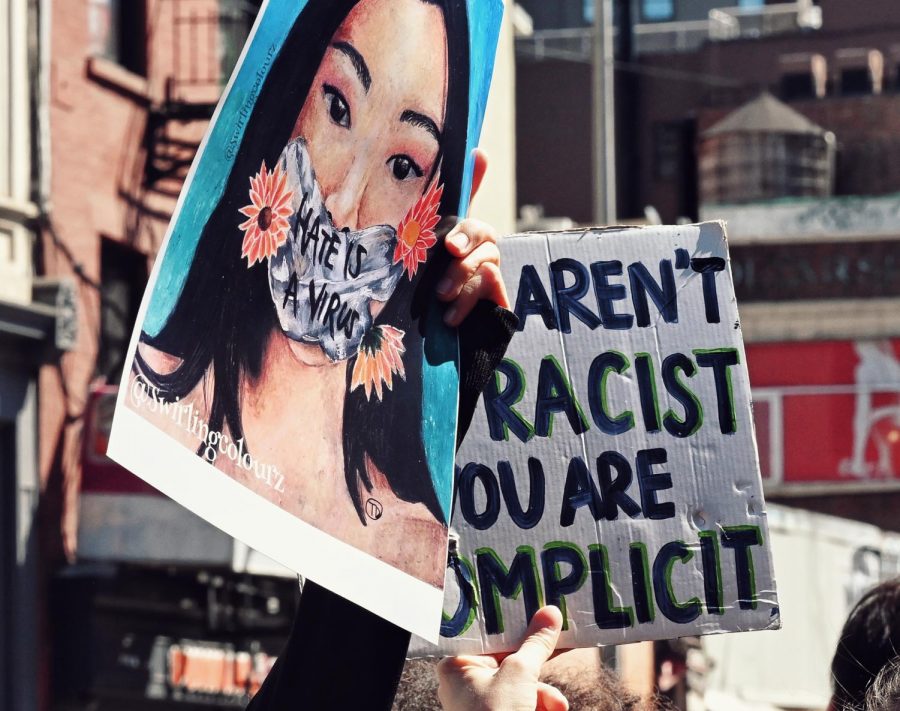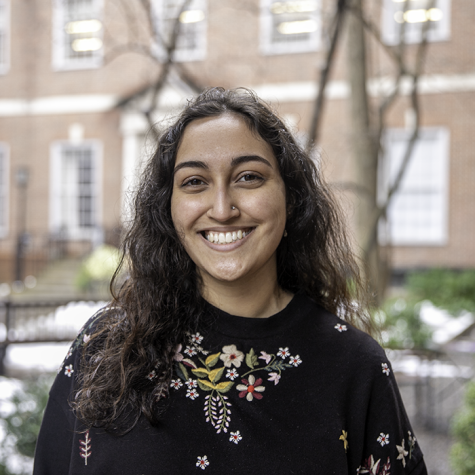Asian students ‘terrified’ by surge in New York City hate crimes
Asian students share stories of the pandemic-related racism and fear they’ve experienced in New York City. This article is the first in Sabrina Choudhary’s series documenting Asian Pacific Islander students’ experiences with race at NYU.
Hate towards Asian, Asian-American, and Pacific Islander people increased during the COVID-19 pandemic. NYU students of Asian and Pacific Islander descent are sharing their experiences with racism in New York City during the pandemic. (Photo by Sirui Wu)
April 26, 2021
Hate toward Asian, Asian-American and Pacific Islander people in the United States is by no means new, but it has surged since the start of the pandemic. Though its roots and expressions are complex, the spike in hate incidents and crimes against Asians over the past year prompted the creation of the Stop AAPI Hate coalition and corresponding activist movement.
The Stop AAPI Hate organization reported roughly 3,800 hate incidents between March 2020 and February 2021, over 2,000 of which occurred in California and New York. The problem has become so great that the U.S. Senate passed a bill with a 94-1 vote on April 22 to streamline the review of pandemic-related hate crime reports.
I spoke with 12 NYU students of Asian and Pacific Islander descent about their experiences with racism in New York City before and since the pandemic. Their stories are as diverse as their ethnicities, nationalities, appearances and identities.
Asya Almukhamet is a Steinhardt junior from Kazakhstan and is Central Asian. Unfortunately, she has many anecdotes about the racism she has faced during the pandemic.
“On the subway, people would be like, ‘Oh, Asians, don’t bring COVID to me,’ like, ‘Don’t bring COVID near me,’ or like, ‘Leave this country,’” she said. “A lot of people, they just watch it, you know. They just watch it. They don’t say anything, which, I don’t know, which hurts even more.”
Almukhamet’s East Asian friends also faced harassment from strangers in the city.
“When corona just started — it was like, March, okay, it had just started — and you know how they all started saying, ‘Oh, this is a Chinese virus?’ And a couple of my friends, they were walking with drinks, and this like man came to them, he took their drinks, he just started pouring it at them, and then he wanted to fight them or something. I don’t know, it was a lot,” she recalled. “I was really shocked.”
These incidents were enough to make Almukhamet rethink her post-graduation plan to live in New York.
“I had my doubts. I was thinking about Canada,” she laughed. “I don’t know. This was my dream.”
For Almukhamet, the prospect of harassment is even scarier because she’s an international student. She fears that if the situation escalates and she tries to defend herself, she could end up getting deported.
“A lot of my [Asian] friends started talking about getting pepper sprays just to be, you know, protected,” she said. “And I was like, ‘Oh, I can’t.’ Like, imagine if I use it and then I get deported because they will probably side with an American, I am sure. They will not take me to the court, they will just like throw me from this country, probably.”
Instead of carrying pepper spray, she now walks with an alarm to alert bystanders if she’s in trouble.
Like Almukhamet, Tisch junior Grace Santos was also harassed by a stranger for being Asian, but her experience stirred different feelings. Santos is a biracial American; her mom is Japanese and her dad is Brazillian. For her, the surge in anti-Asian hate prompted her to think differently about her identity.
“In the very beginning of COVID when we were still in person, my mom was receiving comments in the subway and things. And she told me about it and I felt bad, but I didn’t connect that to me,” Santos explained. “And then when it did happen to me — that was well into COVID, the end of last year maybe — it happened, like someone yelled at me in the streets, and then I was like, ‘Oh sh-t, that’s affecting me,’ and that’s when I started getting scared, I think, but mildly scared. And then when the crime started happening recently? Now I’m terrified.”
Santos told me that growing up, she was always discouraged from identifying as Asian, so becoming a target of anti-Asian hate this year was surprising.
“I’m biracial, so like my whole life has been like, which one am I? I don’t know,” she said.
She explained that as a child, her family in Japan and her Japanese community at home gave her special treatment because she was mixed.
“When I would go to Japan, everyone would treat me like a foreigner, and my grandparents were always praising me that I wasn’t fully Japanese, and they introduced me as like, ‘Oh, this is my American granddaughter and she’s Brazilian,’” Santos explained.
This made her reluctant to consider herself Asian until the pandemic.
“Japanese people don’t see me as fully Japanese and don’t accept me exactly into their culture, so I’ve never seen myself as fully Asian until I guess this whole thing happened, and I do feel scared in the city, and I have been yelled at in the city.”
After being harassed, Santos feels like the Stop AAPI Hate movement represents her as well.
“This movement happening, and me being a victim of [the harassment] and feeling unsafe has forced me to identify as Asian, and it felt like when I wasn’t ready to do so,” she said.
Other Asian students shared that although they have not been harassed, hearing about the surge in hate crimes has made them cautious about going out in the city, especially at night.
Stern junior Alisha Huang is a New Zealander of Chinese descent. She was in the city at the beginning of the pandemic before going home, and hearing about the rise in hate crimes put her on guard, especially at night.
“I would always take the subway … at like 10 o’clock, 11 o’clock. That’s like a normal-ish hour to be out in New York, and you probably wouldn’t give it much thought,” she said. “But then, obviously, after all the hate crimes now, like recently one of the cases of the woman’s backpack being set on fire, that was at Herald Square. That’s the station I go to and get off at on a daily basis, and so it’s kind of just … a wake-up call, and also kind of like a challenge. I mean, it’s made me almost consider myself very privileged that all those times I did take the subway that late that, you know, I was safe.”
CAS junior Johnnie Yu, who is Chinese American, feels similarly uneasy.
“I still don’t know how to properly grasp the level of threat because it’s like, you don’t really know until you experience something. So I guess it’s just like, I’m not sure how safe / dangerous America is or New York is.”
Santos and Almukhamet also fear going out at night, something they never used to worry about. Santos is currently at home in New Jersey, but she often visits the city during the day.
“With the hate crimes, I don’t want to be out when it’s dark, so I always plan everything to be while the sun is out. And so daylight savings time was such a big deal, like I have one more hour that I feel safe to be outside,” she said.
Almukhamet told me that her friends who aren’t directly impacted by the hate crimes don’t seem to understand how they affect her.
“I tell them all, I don’t even go outside right now at night because I’m really scared. And they’re like, ‘Oh, why?’” she said.
If there’s any positive side to this pattern, it’s that these students now feel able to share their experiences in a way they didn’t a year ago. CAS senior Elaine Yue, who is Chinese American, told me that they hadn’t heard widespread discussion of anti-Asian racism since “Crazy Rich Asians” came out in 2018. The Stop AAPI Hate movement is changing the conversation.
“Even when the pandemic started, and East Asian mostly and especially Chinese people were facing a lot of hate and violence for being ‘virus spreaders’ and the ’cause of COVID,’ there wasn’t much [media] coverage on that, it was completely overwhelmed by just the virus itself,” they said. “I feel like this is the first time I get to have a voice to speak out on this kind of thing.”
A version of this article appeared in the Monday, April 26, 2021 e-print edition. Email Sabrina Choudhary at [email protected].




























































































































































